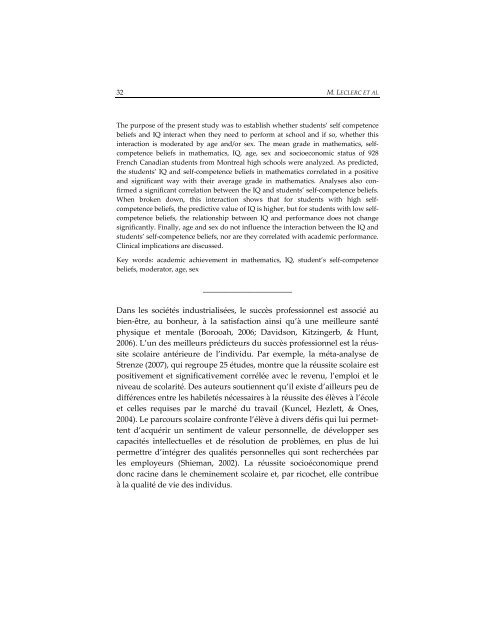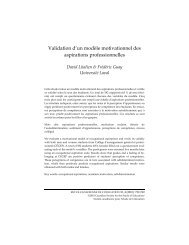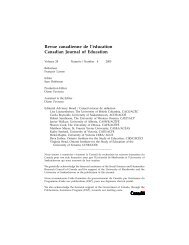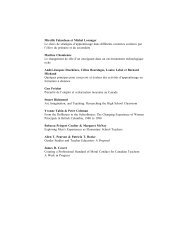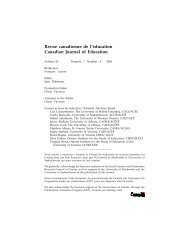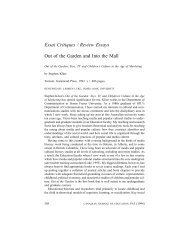Le sentiment de compétence, modérateur du lien entre le QI et le ...
Le sentiment de compétence, modérateur du lien entre le QI et le ...
Le sentiment de compétence, modérateur du lien entre le QI et le ...
Create successful ePaper yourself
Turn your PDF publications into a flip-book with our unique Google optimized e-Paper software.
32 M. LECLERC ET AL<br />
The purpose of the present study was to establish wh<strong>et</strong>her stu<strong>de</strong>nts’ self comp<strong>et</strong>ence<br />
beliefs and IQ interact when they need to perform at school and if so, wh<strong>et</strong>her this<br />
interaction is mo<strong>de</strong>rated by age and/or sex. The mean gra<strong>de</strong> in mathematics, self‐<br />
comp<strong>et</strong>ence beliefs in mathematics, IQ, age, sex and socioeconomic status of 928<br />
French Canadian stu<strong>de</strong>nts from Montreal high schools were analyzed. As predicted,<br />
the stu<strong>de</strong>nts’ IQ and self‐comp<strong>et</strong>ence beliefs in mathematics correlated in a positive<br />
and significant way with their average gra<strong>de</strong> in mathematics. Analyses also con‐<br />
firmed a significant correlation b<strong>et</strong>ween the IQ and stu<strong>de</strong>nts’ self‐comp<strong>et</strong>ence beliefs.<br />
When broken down, this interaction shows that for stu<strong>de</strong>nts with high self‐<br />
comp<strong>et</strong>ence beliefs, the predictive value of IQ is higher, but for stu<strong>de</strong>nts with low self‐<br />
comp<strong>et</strong>ence beliefs, the relationship b<strong>et</strong>ween IQ and performance does not change<br />
significantly. Finally, age and sex do not influence the interaction b<strong>et</strong>ween the IQ and<br />
stu<strong>de</strong>nts’ self‐comp<strong>et</strong>ence beliefs, nor are they correlated with aca<strong>de</strong>mic performance.<br />
Clinical implications are discussed.<br />
Key words: aca<strong>de</strong>mic achievement in mathematics, IQ, stu<strong>de</strong>nt’s self‐comp<strong>et</strong>ence<br />
beliefs, mo<strong>de</strong>rator, age, sex<br />
______________________<br />
Dans <strong>le</strong>s sociétés in<strong>du</strong>strialisées, <strong>le</strong> succès professionnel est associé au<br />
bien‐être, au bonheur, à la satisfaction ainsi qu’à une meil<strong>le</strong>ure santé<br />
physique <strong>et</strong> menta<strong>le</strong> (Borooah, 2006; Davidson, Kitzingerb, & Hunt,<br />
2006). L’un <strong>de</strong>s meil<strong>le</strong>urs prédicteurs <strong>du</strong> succès professionnel est la réus‐<br />
site scolaire antérieure <strong>de</strong> l’indivi<strong>du</strong>. Par exemp<strong>le</strong>, la méta‐analyse <strong>de</strong><br />
Strenze (2007), qui regroupe 25 étu<strong>de</strong>s, montre que la réussite scolaire est<br />
positivement <strong>et</strong> significativement corrélée avec <strong>le</strong> revenu, l’emploi <strong>et</strong> <strong>le</strong><br />
niveau <strong>de</strong> scolarité. Des auteurs soutiennent qu’il existe d’ail<strong>le</strong>urs peu <strong>de</strong><br />
différences <strong>entre</strong> <strong>le</strong>s habi<strong>le</strong>tés nécessaires à la réussite <strong>de</strong>s élèves à l’éco<strong>le</strong><br />
<strong>et</strong> cel<strong>le</strong>s requises par <strong>le</strong> marché <strong>du</strong> travail (Kuncel, Hez<strong>le</strong>tt, & Ones,<br />
2004). <strong>Le</strong> parcours scolaire confronte l’élève à divers défis qui lui perm<strong>et</strong>‐<br />
tent d’acquérir un <strong>sentiment</strong> <strong>de</strong> va<strong>le</strong>ur personnel<strong>le</strong>, <strong>de</strong> développer ses<br />
capacités intel<strong>le</strong>ctuel<strong>le</strong>s <strong>et</strong> <strong>de</strong> résolution <strong>de</strong> problèmes, en plus <strong>de</strong> lui<br />
perm<strong>et</strong>tre d’intégrer <strong>de</strong>s qualités personnel<strong>le</strong>s qui sont recherchées par<br />
<strong>le</strong>s employeurs (Shieman, 2002). La réussite socioéconomique prend<br />
donc racine dans <strong>le</strong> cheminement scolaire <strong>et</strong>, par ricoch<strong>et</strong>, el<strong>le</strong> contribue<br />
à la qualité <strong>de</strong> vie <strong>de</strong>s indivi<strong>du</strong>s.


